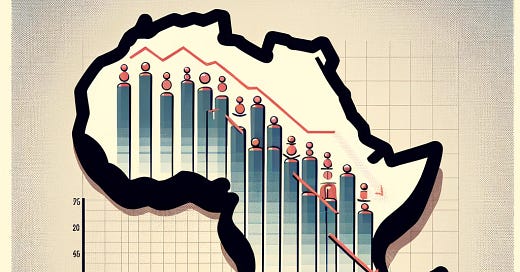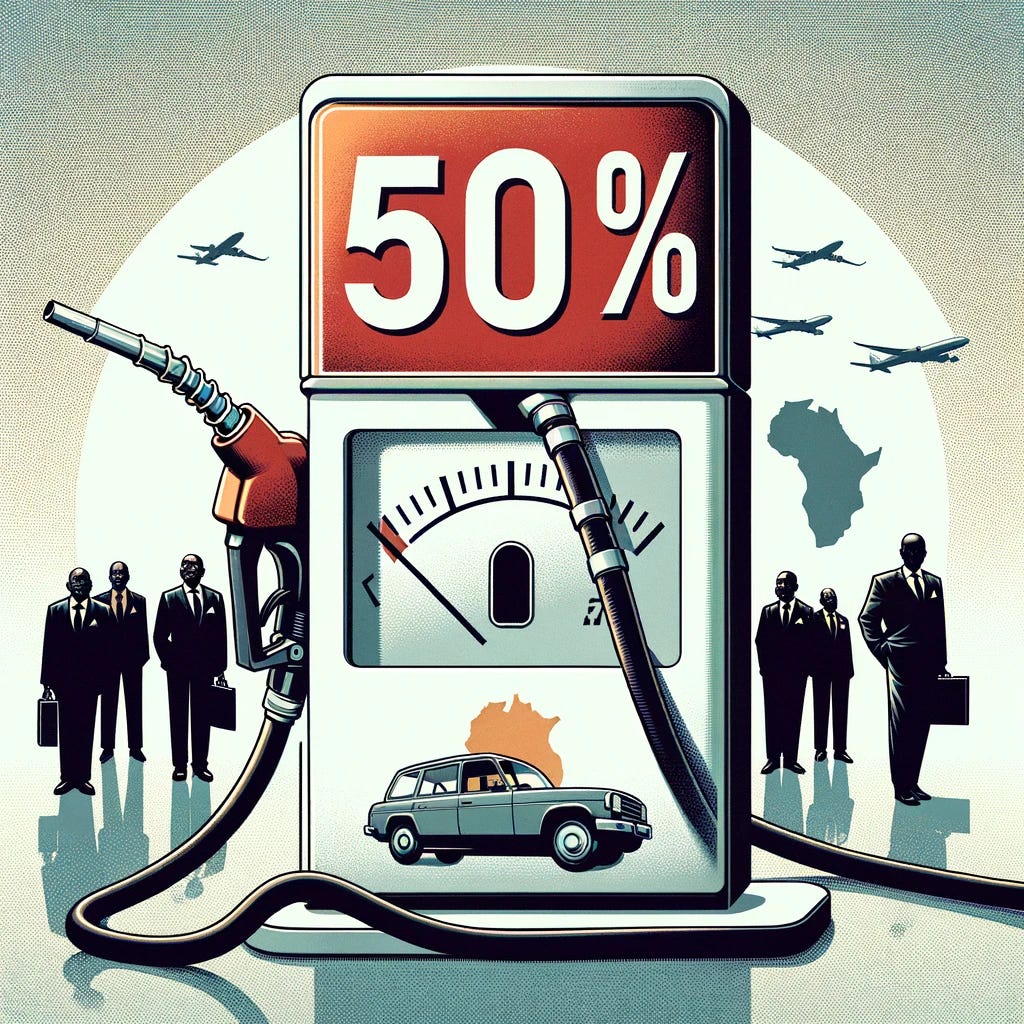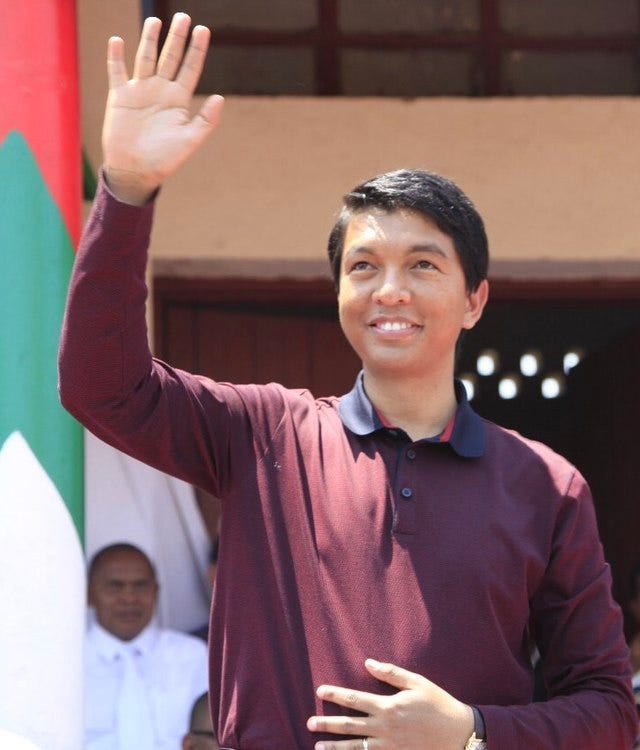🔅 Africa's Fertility Rates: Fast Fall or Future Boom?
Plus: Madagascar's Messy Election, Malawi Cuts Allowances to Save Money, And more.
Photo of the day
Eswatini

Markets:
🟢 Nigerian SE: 70,840.72 (+0.25%)
🟢 Johannesburg SE: 73,443.50 (+2.14%)
— Ghana SE: 3,195.46 (0.00%)
🟢 Nairobi SE: 90.23 (+0.98%)
🟢 US S&P 500: 4,518.43 (+0.51%)
🟢 Shanghai Composite: 3,072.83 (+0.55%)
Kenya's Cash Boost: IMF Gives the Green Light | Kenya just got a major cash infusion from the International Monetary Fund, unlocking a $682.3 million tranche and increasing the country's total funding to $4.43 billion. The East African nation has been struggling with liquidity issues, thanks to uncertainty about accessing financial markets and frequent droughts caused by climate change. But with this new funding, Kenya can pay off its upcoming $2 billion Eurobond without depleting its reserves. And the cherry on top? The IMF deal was even bigger than expected.
*Data accurate as of the close of markets across the continent
Brief & Bright: Africa's Top Five
Africa's Fertility Rates: Fast Fall or Future Boom?
Africa has one of the highest fertility rates in the world, but things are changing as the region experiences economic growth. Some researchers predict that Africa will undergo a rapid demographic transition, like East Asia did, where population growth significantly slowed down as it grew wealthier. And there's evidence to back it up: Nigeria's fertility rate dropped by 17% in just five years. The UN's projections vary widely, and a high estimate for the year 2100 is set at 14.7 billion, while a low (and more likely) one is 7.0 billion. Because the continent will be the world's most populated, these numbers will have a huge impact on when the global population will peak.
Malawi's President Cuts Travel and Fuel Allowances to Save Money
Looks like Malawi's President Lazarus Chakwera is tightening his belt and trying to save some cash. He's suspended all international travel for himself and his government, and ordered all ministers currently abroad to come back home ASAP. Plus, he's slashing fuel allowances for senior officials by 50%. This is all part of an effort to turn around Malawi's struggling economy, which has been hit hard by a currency devaluation (of about 30%) and high inflation. Looks like the President may have had to make some concessions to secure a loan from the International Monetary Fund. Indeed, it came right before an IMF loan approval, in which the country has been given a much-needed loan of $178 million, with an immediate disbursement of $35 million. The loan will also unlock financial support from other development partners, with the World Bank potentially giving Malawi over $500 million for trade, fiscal reforms, and agriculture. This injection of foreign investment is expected to boost the country's foreign exchange reserves and provide much-needed stability for economic and business growth.
Madagascar's Messy Election: A Boycott, a Curfew, and Only Three Candidates
It was election day yesterday in Madagascar, but it was a bit of a flop. Many people stayed home in response to calls from opposition leaders and civil society groups to boycott the election. And who can blame them? The choices were pretty limited: just three men, including the current president who is seeking a second term. Andry Rajoelina has been nicknamed the “Builder President” for all the infrastructure projects he’s done, but some say they’re just fancy buildings that don’t do much. Plus, there was a violent crackdown on protests before the election, which didn’t exactly help his democratic reputation. One of his biggest challengers is a former ally-turned-foe who is a wealthy businessman and also the deputy for a city in the far south. Another candidate is relatively unknown and has lived in France for most of his life. And let’s not forget that the opposition claims the president shouldn’t even have been allowed to run in the first place because he has French citizenship, which should have stripped him of his Malagasy nationality. But the country’s highest court said it’s all good, so here we are.
Botswana's Diamond Dilemma: Reevaluating a Relationship with HB Antwerp

Botswana is having some trust issues with HB Antwerp, a Belgian diamond trader it had planned to buy a 24% stake in. President Mokgweetsi Masisi announced on Monday that the country is conducting some "due diligence" on the company after Canadian miner Lucara Diamond cut ties with HB due to a "material breach of financial commitments." Earlier this year, Botswana had announced that it would supply HB with 10% of its rough diamond output for five years, but now they're reconsidering that plan.
Ford's Electric Dreams: Investing in South Africa's Future

The South African unit of Ford is making moves to keep up with the times. The company has announced a 5.2 billion rand ($281m) investment to produce a hybrid vehicle in the country. However, it is also urging the government to get their electric vehicle policy in gear—the UK and Europe are already planning to ban the sale of new petrol cars by 2035, which could put a severe dent in South Africa's auto industry. While they wait for the government to make a move, Ford is focusing on producing cars that can run on both petrol and electric. They're starting with the Ranger Plug-in Hybrid Electric Vehicle, set to hit the streets in 2024, and plan to export 70% of all hybrids produced in-country.
Food for Thought
“God has created lands with lakes and bountiful rivers for man to live. And the wide deserts so that he can find his soul."
— Tuareg Proverb






